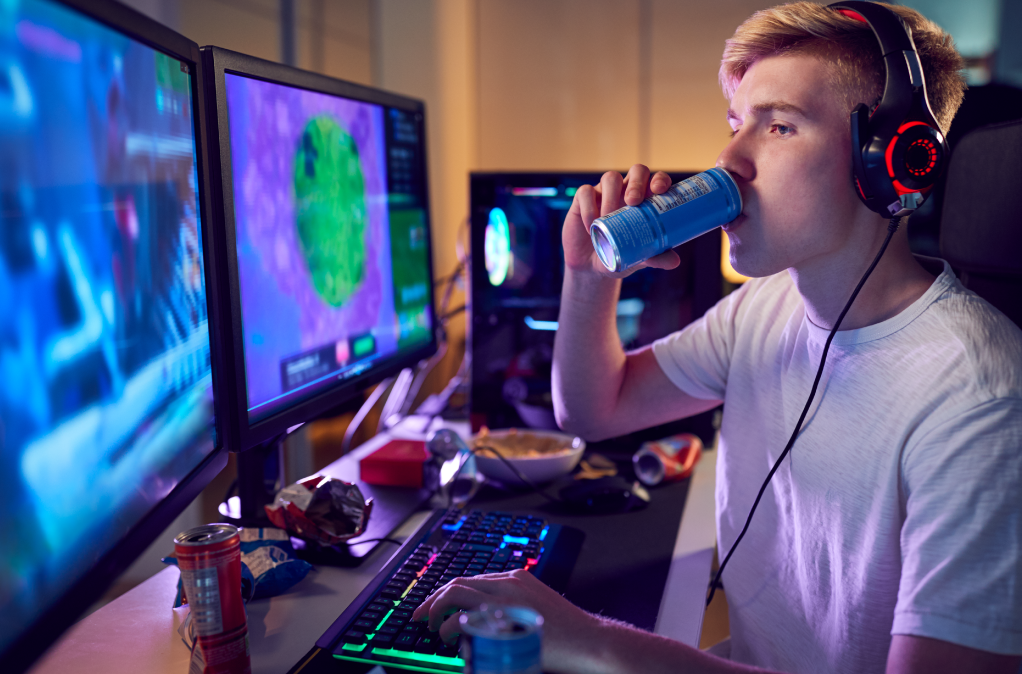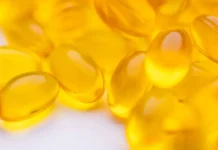Emotional Damage Energy Drink Reviews and Comparisons
It seems energy drinks are more popular than ever, with the global energy drink market expected to reach $68.1 billion in 2022. Motivated by pandemic stressors and increased work and home responsibilities, more and more consumers are looking for a quick energy fix, but are the most popular energy drinks the best options?
Emotional Damage offers a new take on the standard energy drink, with a moderate quantity of caffeine and a mix of antioxidants, minerals, superfoods, and nootropic ingredients. Keep reading to discover how Emotional Damage compares to some of the most popular energy drinks on the market, and some promising alternatives.
Additional Articles:
Sea Moss Benefits For men: Top 10
Healthy Hacks To Increase Wakefulness
Emotional Damage energy drink: the Basics
Emotional Damage is a special version of the GG® energy drink formula sold by Gamer Supps, a New Jersey-based gaming energy and nutrition maker. Emotional Damage energy drink gets its name from a meme made famous by comedian and YouTuber, Steven He. Packaged as a strawberry-peach drink mix that can be added to water, this product is marketed primarily to gamers, and comes at a very reasonable price of about $0.35 per serving. As energy drink consumption among adolescents has been associated with behavioral issues and poor sleep, parents should be wary of energy products marketed to youth.
Emotional Damage contains vitamin C, B vitamins, and vitamin D3, as well as certain minerals, antioxidants, electrolytes, and nootropic ingredients. In addition to its positive effects on immunity, vitamin C supports brain health to enhance attention, memory, and focus.
This popular energy drink also gives you a dose of organic caffeine derived from non-GMO coffee beans. As a central nervous system (CNS) stimulant, caffeine can boost mood, reaction time, alertness, and visual attention while it combats fatigue. Each serving of Emotional Damage contains about 100 mg of caffeine, about the same amount that you would find in a cup of coffee.
Nootropics are natural or synthetic substances that improve mental skills. Emotional Damage contains L-theanine, a brain-boosting amino acid that increases levels of dopamine, serotonin, and GABA for a feeling of relaxed alertness. In addition, the anti-anxiety effect of L-theanine is known to reduce the jitters associated with caffeine consumption. Emotional Damage energy drink also contains superfoods like Acai berry and Goji berry, plus other nootropic ingredients like L-tyrosine.
It is sweetened with erythritol, a sugar alcohol that is generally considered safe but may cause stomach upset at higher doses. While Emotional Damage has zero calories, health-conscious consumers may be turned off by the product’s use of an artificial sweetener. The main downside of this energy drink is that it is hard to know whether the quantities of antioxidants and nootropic ingredients are high enough to make an impact, as is common with many supplements containing long lists of ingredients. A caffeine-free version is also available.
Emotional Damage energy drink vs. Red Bull
Red Bull is perhaps the most popular energy drink on the market, and its ingredient list is much shorter than the one you’ll find on Emotional Damage. The primary ingredients in Red Bull are carbonated water, sugar, taurine, and caffeine. However, Red Bull is much more expensive, at about $2.50 for an 8.4 oz can. Taurine is an amino acid thought to increase alertness, and it is found in small quantities in some foods. While it has antioxidant and anti-inflammatory properties, taurine is sometimes associated with disruptions in nitrogen balance and kidney strain.
Much like Emotional Damage energy drink, Red Bull contains a relatively modest amount of caffeine, weighing in at 80 mg per 8.4 oz can, but that’s where the similarities end. An 8.4 oz can of Red Bull contains 110 calories and 27 grams of sugar. Experts recommend a maximum of 25 grams of added sugar per day for women and 36 grams for men, so a single can of Red Bull brings female consumers over the limit and male consumers very close to an unhealthy level.
While a sugar-free version of Red Bull is available, this product is sweetened with Aspartame and Acesulfame K, two artificial sweeteners that have been associated with negative health effects such as shifts in the gut microbiome, inflammation, and even obesity.
Emotional Damage energy drink vs. Monster
Monster is a popular energy drink that tops $1 billion in annual revenue. It is much more expensive than Emotional Damage, with a cost per can of about $2.79 for 16 oz. Each can of Monster weighs in at 160 mg of caffeine and a whopping 54 grams of sugar. While consumers may notice a jolt of energy right after consuming Monster, the high caffeine and sugar content of this energy drink is sure to produce a crash within a couple of hours. At 210 calories per can, Monster would not be a desirable choice for health-conscious consumers.
The ingredient list of Monster is similar to the one you’ll find on Red Bull, with carbonated water, sugar, taurine, and caffeine near the top. Monster also contains L-carnitine, a chemical popular among bodybuilders that may help the body turn fat into energy, but may cause side effects like stomach upset.
Overall, the drawbacks of Monster outweigh the benefits, and energy drink consumers may prefer a product with less sugar and calories. Monster does offer a low-calorie version, but this product is sweetened with acesulfame potassium and sucralose. Like some other artificial sweeteners, sucralose has been associated with damage to the gut microbiome and weight gain.
Emotional Damage energy drink vs. Bang
Bang is perhaps best known for its proprietary ingredient, Super Creatine, a version of creatine containing L-leucine that is thought to improve clarity and focus. Creatine is popular among athletes for its role in bulking up muscles and aiding muscle recovery after workouts. Twelve-can packs of Bang are sold for about $26, with the cost of a single can coming to around $2. Like Red Bull and Monster, Bang is a much more expensive option when compared to Emotional Damage. While Bang boasts zero sugar and zero calories per can, it is sweetened with sucralose.
The major downside of Bang is its high caffeine content, at about 300 mg per 16-oz. can. Experts estimate a safe level of caffeine consumption to be about 300 mg for an entire day, and high doses can cause nervousness and even impair focus. Furthermore, overconsumption of caffeine can make it difficult to sleep at night, leading to cognitive impairment after a night of tossing and turning. While sensitivity to caffeine varies by age, weight, previous consumption, and anxiety levels, the average person only needs about 75 mg of caffeine to boost focus and alertness.
Emotional Damage energy drink vs. VOKE-Energy
VOKE, a United States-based company founded in 2014, produces a unique superfood tablet that is convenient, natural, and free of artificial flavors and sweeteners. Like Emotional Damage, VOKE contains a moderate quantity of caffeine, at about 75 mg per serving; however, VOKE is made with green tea caffeine, which is thought to release energy more slowly than caffeine derived from coffee.
While you might get the jitters from other forms of caffeine, green tea caffeine can boost alertness without causing unpleasant side effects. Sold in packets of 60 chewables, VOKE weighs in at about $0.87 per serving, only slightly higher than the cost of Emotional Damage.
Most notably, VOKE contains Acerola cherry, derived from a tropical plant with berries known for their ultra-high vitamin C content. You can also find nitrate-rich beetroot in this product, which increases blood flow to muscles, giving them the oxygen and nutrients they need.
Finally, VOKE contains guarana (Paullinia cupana), a natural stimulant sourced from the Brazilian Amazon. Guarana contains caffeine plus theophylline and theobromine, which combine to increase focus, alertness, and endurance. With a relatively short list of ingredients, VOKE promises a potent energy boost without the unpleasant nervousness and insomnia that other stimulants may cause. It can even be taken in the late afternoon.
Emotional Damage energy drink vs. Quantumind by Evolvere
Evolvere was founded in 2016 by former collegiate athlete and health coach Neal Thakkar, and this notable company offers coaching services in addition to quality nootropic supplements. Evolvere produces a brain-boosting supplement called Quantumind, which promises to increase energy, productivity, and focus. Sold at $44.99 for 60 capsules, Quantumind is marketed to adults and comes at a price point of about $2.25 for each 3-capsule dose. (Subscribers can purchase 60 capsules for a reduced price of $26.99, reducing the cost by 40%.)
Quantumind offers a completely different model from Emotional Damage and other popular energy drinks. With a short ingredient list, Quantumind promises potency and effectiveness without overstimulating. The green tea in this supplement stimulates and reduces anxiety at the same time to produce a feeling of relaxed alertness.
Ashwagandha boosts memory and cognition, and the name of this Ayurvedic herb means ‘smell of horse’ in Sanskrit, as it is said to bestow users with the vigor of a stallion. Quantumind also contains Panax ginseng, which has well-established nootropic effects and may improve mood and energy. Since it is packaged in capsule form, Quantumind is free of the sugar, calories, or artificial sweeteners that prove harmful in popular energy drinks.
Emotional Damage energy drink vs. Brilliance by MyPEAK Supplements
MyPEAK is a science-based brand offering a standout nootropic supplement called Brilliance. Brilliance promises sustained 8-hour energy, increased productivity, improved focus and memory, and reduced fatigue and stress. Sold at $38.00 for a 30-day supply, Brilliance weighs in at about $1.27 per dose, which is a higher price point than the very cost-effective Emotional Damage, but far less expensive than most popular energy drinks.
Marketed to adults, Brilliance achieves its effects through much subtler means than Emotional Damage. MyPEAK formulated Brilliance with a cutting-edge blend of nootropics, including Teacrine ®, a nature-identical compound analogous to theacrine. Theacrine is derived from the Camellia assamica plant, which is commonly used to make Kucha tea. While it is not a form of caffeine, Teacrine ® improves mental clarity, energizes muscles, and boosts motivation.
Brilliance also contains Cognizin ® Citicoline, Rhodiola, Gingko Biloba, Huperzine A, Methylfolate, Thiamine, Niacin, and other brain-boosting ingredients. Unlike caffeine-containing energy products like Emotional Damage, you won’t build a tolerance to Brilliance. This product comes in capsule form and is also plant-based and vegan, so you can boost your energy without having to worry about the dangers of caffeine, sugar, or artificial sweeteners.
Should you try an energy drink? Should you try an alternative?
It seems as though life has become more hectic and stressful than ever, and it may be tempting to reach for an energy drink for a quick boost. However, energy drinks with high sugar and caffeine content can leave you feeling jittery, only to crash a couple of hours later. Even worse, you may struggle to relax at night, setting yourself up for a vicious cycle of sleep deprivation, fatigue, and energy spikes and crashes during the day. So how can you get the steady energy and focus that you need without self-sabotaging?
Good health is the key to finding abundant energy to work hard and do the things you love. Sound nutrition, moderate exercise, and proper rest will pave the way to healthy energy levels; however, many of us could benefit from the extra boost provided by stimulant and nootropic supplements. Fortunately, there are several promising supplements on the market that can help you to be a more focused, productive version of yourself. You don’t have to pay for increased energy with crashes or sleepless nights. With the right supplement, you can truly have it all.
Further reading:
U.S. News: Are Energy Drinks Really That Bad?
CNN: Energy drinks may have unintended health risks
Disclaimer
Important Note: The information contained in this article is for general informational purposes only, and should not be construed as health or medical advice, nor is it intended to diagnose, prevent, treat, or cure any disease or health condition. Before embarking on any diet, fitness regimen, or program of nutritional supplementation, it is advisable to consult your healthcare professional in order to determine its safety and probable efficacy in terms of your individual state of health.




